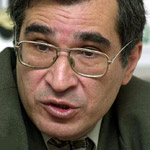Matthew Bryza is not acting like a co-chairman, but rather the special ambassador doing whatever the U.S. tells him to do. Rector of the Linguistics University named after V. Bryusov Suren Zolyan touched upon the announcements made by the OSCE Minsk Group American co-chairman Matthew Bryza during a press conference at the National Press Club.
While speaking about the co-chairman’s comment about Azerbaijan having “good tendencies” towards democracy and that the OSCE Minsk Group would like to see those tendencies in Armenia, Zolyan considered that comparison as “incomprehensible” and added:
“Armenia shouldn’t be compared to a country like Azerbaijan, but rather Lithuania or Estonia.”
According to Zolyan, the reason for this comparison is that Bryza is really solving the issue of the U.S due to the fact that he wanted to explain why Bush approves Aliev and disapproves Robert Kocharyan. Let’s leave that aside and find out what’s so surprising about Bryza “solving the issue of the U.S.” What else should the American co-chairman do?
In addition, Zolyan also touched upon the announcement made by the OSCE Minsk Group co-chairmen when they said that they could no longer come up with ways of recognizing, formulating and preparing a final draft of the principles. Zolyan advised him to resign and find a more suitable job.
“If you can’t imagine, then resign and find a better job.”
Mr. Zolyan suggests that the co-chairman countries to call back their representatives and appoint co-chairmen with a better imagination. The politician believes that “Armenia doesn’t control the Karabakh conflict events”.
“We can have some influence, but that’s not principal,” siad Zolyan. He believes that if Armenia helps change the internal situation of Karabakh, the demography and increase the population, then that may become decisive. Zolyan is also of the opinion that the strengthening of democracy will strengthen Armenia’s position in the Karabakh conflict. There are bases for strengthening democracy and if there is a political will, then, according to the press conference speaker, everything will be fine.
Zolyan predicts that the format of the Karabakh conflict settlement will not change because no court is ready to take on the responsibility as long as things are not stable in the region. He believes that the U.S. was responsible for revealing the negotiations principles. There were a couple of goals, one of which is the fact that before the U.S. presidential elections, Bush tried to explain to the international community that the U.S had done its best to settle the conflict, but the sides haven’t realized what advantage they have and haven’t agreed.
“It’s interesting to see that the OSCE Minsk Group announcement was placed on the U.S. Department website and not the OSCE website,” said Zolyan.
According to Zolyan, revealing the negotiations package deal didn’t speed up the negotiations process, rather it slowed down. The politician was surprised to see that the European Union didn’t respond to the OSCE Minsk Group’s announcement. In regard to the recent Karabakh conflict announcement made by the foreign ministers of the countries representing the “Great Eight” at the summit, according to which the foreign ministers of the “Great Eight” called on the Armenian and Azerbaijani presidents to show political will and settle the conflict this year by preparing their people for peace, Mr. Zolyan said that that announcement means nothing because the “Great Eight” summit is “non-official”. Zolyan believes that the Karabakh conflict settlement is currently in a deadlock and the reason for that is the events taking place in the world-the Baku-Jeyhan oil pipeline transaction, the “Great Eight” summit, etc. Zolyan says that Armenia, Karabakh, Azerbaijan, the intermediaries and other countries want to keep things going at this rate because that is the only guarantee for stability. What can economically counterbalance the Baku-Jeyhan oil pipeline?
“Of course, there are some technological advances, which help circumvent communications problems. But you must have a different model. In other words, the basis is education, science and high technology. You need to have a different political culture and the system of governance must be at a higher level,” says politician Zolyan.
During the conference, he also touched upon founding new parties and the advantages. In his words, the parties founded are not clans and if a party is founded, it’s obvious that it must have a plan and certain people in charge of that.
“They must gather in a hall, the public has to see them and not in some corner of the restaurant or an auditorium. They have to be forced to answer journalists’ questions, so they have to read a couple of books. I consider the founding of parties positive from this perspective,” says Zolyan.

